#Companies who offshore
Text
Outsourcing to india 8
Offshoring To India In 2023: High Tendencies, Companies, Execs, Cons
Also, there is no continuity within the project delivery since outsourced abilities are always rotating. As part of its huge restructure, Telstra outsourced to India to fill new software engineering jobs. Roles in software engineering, information and cybersecurity were outsourced to India.
youtube
One of the advantages of utilizing Magento as your shopping cart platform is Acelerar can also give you end-to-end assist with knowledge entry services. After hiring candidates Premium help prepare their group members as per the industry requirements. Premium Help has been providing quality information entry services for greater than 10+ years.
ValueCoders is a superb place to start out if you’re trying to find a software program outsourcing firm in India. Their builders are skilled with growing all technologies including blockchain, cellular, ecommerce & CMS, net & fullstack, and more. Not to mention they're well-versed within the languages you require to develop your technology. By hiring a knowledge entry outsourcing firm in India, you’ll save plenty of money and time. Their purchasers retention price of ninety eight.9% speaks for their high quality of providers.
World Delivery Facilities
Besides that, some of their employees don’t have the flexibility to supply gear for themselves throughout lockdown. Agents can answer basic questions from sufferers like schedule and billing inquiries. Make a quick, and make sure to include all the planning steps that you have in thoughts. Describe the concept you may have and just ensure you focus lots on communication. While the outsourcing industry continues to grow the pandemic has affected India like just about anywhere else on the planet. This has impacted both availability and access to the workforce in plenty of sectors of the Indian financial system.
Latin America largely provides a bunch of generic abilities which options on the mid- to low-end of the expertise spectrum, Vohra says.
Due to linguistic and cultural obstacles, companies struggle to supply their outsourced initiatives the attention and creativity they deserve.
Pioneered as a custom Blockchain solutions supplier, Accubits is doubtless certainly one of the oldest and most experienced Blockchain growth houses out there.
We are an unbiased enterprise unit underneath the Kochartech umbrella, functioning as a expertise driven Back Office Operations vertical.
When outsourcing to India, you have to supply all the major points of your project.
One of probably the most ordinary outsourcing issues companies have is a communication barrier, which can sometimes result in a drop in project delivery quality. As a result, the outsourcing firm will be aware of your company’s business processes, such as payroll, as well as personal information, such as salary. Therefore, make sure to pay shut consideration to the type of info that you simply provide them access to. Outsourcing to India has proven to be very advantageous and competitive for businesses as globalization has progressed. Besides, without a query, one of the prime outsourcing places for software improvement in India. India got to the place it's right now because of the knowledgeable software program developers, imaginative designers, and expert advisors working together on a platform revered by administrative support.
Greatest Practices To Make Sure Successful Software Outsourcing To India
MMF’s dynamic choices embody augmentation of static in addition to dynamic websites, internet and native cellular applications and all other software based options. Recognizing their customer support, normal development & design course of, nearly 75% of their shoppers chose them for a second engagement. India Interactive, an IT resolution provider company, was founded in 2006 by experts having greater than 15 years of experience in varied fields and expertise in IT Consultancy. Today, they’re supported by a strong staff of 300+ superior folks distributed throughout four places of work – Gurugram, Chandigarh, Sydney & London – and an ever-growing list of happy shoppers. Classic Informatics is an award-winning staff of inventive technologists, development hackers & drawback solvers & growth-hackers, delivering elegant digital merchandise for consumers, businesses and industries.

The company had aimed to develop quick solutions and applied sciences to satisfy customer calls for. This urged Cisco to arrange its second-largest research and improvement facility in Bangalore. 24-hour monitoring and technical sales and help are some of the services offered. Our firm constructed teams the exhausting method in a time where bandwidth latency and point-to-point VPN connectivity had been vital obstacles to what you would do in India. Call heart providers, chip designs, transaction processing, and software program providers are all obtainable in New Delhi, Gurgaon, and Noida.
Huge Outsourcing Companies In India And Their Struggles
Because of this, clients are positive that their outsourced staff might be utilizing the latest and best in software program expertise. Quality providers supplied by country’s expert professionals is what primarily attracts corporations to determine on India for his or her outsourcing wants. This means that outsourcing corporations and shoppers are given entry to a vast pool of younger and seasoned abilities.
Now that you know the benefits of outsourcing software development to India, let’s look into its challenges. India ranks 1st on the 2021 Kearney Global Services Location Index with an total score of 7.09. This index assesses the countries’ capability to ship services based mostly on parameters like monetary potential, talent availability, business environment, digital resonance, etc. With such talent potential, you usually have a tendency to discover a freelance Indian programmer or an IT outsourcing company offering high quality software program solutions for your wants. So as a substitute of employing in-house developers, you can outsource software improvement tasks to India to save heaps of big amounts of money. One of the first explanation why companies outsource software program development to India is to save money.
Finding the perfect companion to satisfy your outsourcing wants could be tough at occasions. A lack of enough due diligence on the suppliers is amongst the typical outsourcing issues that many businesses encounter. As a end result, the project you outsourced can end up being of poorer high quality. Outsource in India greatly lower their probability of receiving subpar companies and information breaches. After operations are outsourced, service providers ensure that tasks are completed shortly and without any improper handling of delicate info. Cost of outsourced services should be a key consideration when choosing an outsourcing company.
#Outsourcing#Outsourcing companies#Outsourcing call centre#Outsourcing services#Outsourcing to india#Outsourcing to philippines#Companies who outsource#Companies who offshore#Top companies for outsourcing#Software outsourcing companies
1 note
·
View note
Text
The Best News of Last Year - 2023 Edition
Welcome to our special edition newsletter recapping the best news from the past year. I've picked one highlight from each month to give you a snapshot of 2023. No frills, just straightforward news that mattered. Let's relive the good stuff that made our year shine.
January - London: Girl with incurable cancer recovers after pioneering treatment

A girl’s incurable cancer has been cleared from her body after what scientists have described as the most sophisticated cell engineering to date.
2. February - Utah legislature unanimously passes ban on LGBTQ conversion therapy

The Utah State Legislature has unanimously approved a bill that enshrines into law a ban on LGBTQ conversion therapy.
3. March - First vaccine for honeybees could save billions

The United States Department of Agriculture (USDA) has approved the world’s first-ever vaccine intended to address the global decline of honeybees. It will help protect honeybees from American foulbrood, a contagious bacterial disease which can destroy entire colonies.
4. April - Fungi discovered that can eat plastic in just 140 days

Australian scientists have successfully used backyard mould to break down one of the world's most stubborn plastics — a discovery they hope could ease the burden of the global recycling crisis within years.
5. May - Ocean Cleanup removes 200,000th kilogram of plastic from the Pacific Ocean

The Dutch offshore restoration project, Ocean Cleanup, says it has reached a milestone. The organization's plastic catching efforts have now fished more than 200,000 kilograms of plastic out of the Pacific Ocean, Ocean Cleanup said on Twitter.
6. June - U.S. judge blocks Florida ban on care for trans minors in narrow ruling, says ‘gender identity is real’

A federal judge temporarily blocked portions of a new Florida law that bans transgender minors from receiving puberty blockers, ruling Tuesday that the state has no rational basis for denying patients treatment.
7. July - World’s largest Phosphate deposit discovered in Norway

A massive underground deposit of high-grade phosphate rock in Norway, pitched as the world’s largest, is big enough to satisfy world demand for fertilisers, solar panels and electric car batteries over the next 50 years, according to the company exploiting the resource.
8. August - Successful room temperature ambient-pressure magnetic levitation of LK-99

If the claim by Sukbae Lee and Ji-Hoon Kim of South Korea’s Quantum Energy Research Centre holds up, the material could usher in all sorts of technological marvels, such as levitating vehicles and perfectly efficient electrical grids.
9. September - World’s 1st drug to regrow teeth enters clinical trials

The ability to regrow your own teeth could be just around the corner. A team of scientists, led by a Japanese pharmaceutical startup, are getting set to start human trials on a new drug that has successfully grown new teeth in animal test subjects.
10. October - Nobel Prize goes to scientists behind mRNA Covid vaccines

The Nobel Prize in Physiology or Medicine has been awarded to a pair of scientists who developed the technology that led to the mRNA Covid vaccines. Professors Katalin Kariko and Drew Weissman will share the prize.
11. November - No cases of cancer caused by HPV in Norwegian 25-year olds, the first cohort to be mass vaccinated for HPV.
Last year there were zero cases of cervical cancer in the group that was vaccinated in 2009 against the HPV virus, which can cause the cancer in women.
12. December - President Biden announces he’s pardoning all convictions of federal marijuana possession

President Joe Biden announced Friday he's issuing a federal pardon to every American who has used marijuana in the past, including those who were never arrested or prosecuted.
------
And there you have it – a year's worth of uplifting news! I hope these positive stories brought a bit of joy to your inbox. As I wrap up this special edition, I want to thank all my supporters!
Buy me a coffee ❤️
Merry Christmas and Happy New Year!
6K notes
·
View notes
Text
On the subject of the Titanic ‘submersible’ that was lost in the deep with all its wealthy tourists— it’s so insane/eerie in hindsight to read this article from the Smithsonian that interviews the CEO Stockton Rush long before the disaster.
Despite the Smithsonian supposedly being an organization that cares about science and truth, and the fact that there were SO MANY obvious red flags from the beginning and so many people criticizing the company…..the article is a puff piece uncritically glorifying the CEO’s obviously terrible submersible project. It compares him in glowing terms to Elon Musk. It is an article about how private ventures like those of Stockton Rush and Elon Musk can and should be the future of the world.
We’ve obviously learned now that there were whistleblowers at the company who were warning for a long time that Stockton Rush’s submersible was unsafe— only to be fired and then sued. It makes sense the submersible was so unsafe, because the CEO in this interview is open about how he has no background in underwater engineering and is annoyed by quote “regulations that needlessly prioritize passenger safety.”
Soon after, the private [submersible] market died too, Rush found, for two reasons that were “understandable but illogical.” First, subs gained a reputation for danger. Working on offshore rigs in harsh locations like the North Sea, saturation divers, who breathe gas mixtures to avoid diving sicknesses, would be taken in subs to work at great depths. It was the world’s most perilous job, with frequent fatalities. (“It wasn’t the sub’s fault,” says Rush.) To save lives, the industries moved toward using underwater robots to perform the same work.
Second, tourist subs, which could once be skippered by anyone with a U.S. Coast Guard captain’s license, were regulated by the Passenger Vessel Safety Act of 1993, which imposed rigorous new manufacturing and inspection requirements and prohibited dives below 150 feet. The law was well-meaning, Rush says, but he believes it needlessly prioritized passenger safety over commercial innovation (a position a less adventurous submariner might find open to debate). “There hasn’t been an injury in the commercial sub industry in over 35 years. It’s obscenely safe, because they have all these regulations. But it also hasn’t innovated or grown—because they have all these regulations.”
The fact that Stockton Rush (who was piloting the submarine when the disaster happened) is on record complaining about the evils of regulations that prioritize people’s safety, and the Smithsonian uncritically regurgitated that rhetoric in their glowing puff piece about how rich tycoons like Elon Musk and Stockton Rush are going to save the world is just…..in hindsight of how everything ended it’s just so much horrible black comedy? It’s like a satire about the dangers of uncritically worshipping the rich.
It is mentioned in the article that Rush chose to make his submersible in a different shape, and with a different (cheaper) material than is usually used for submersibles. The article frames this as a result of daring innovation, and not of negligence/ignorance. This passage in particular, which in context is supposed to portray Rush’s critics as joyless naysayers who were proven wrong by the noble tycoon, is pretty foreboding in hindsight:
Rush planned to pilot the sub himself, which critics said was an unnecessary risk: Under pressure, the experimental carbon fiber hull might, in the jargon of the sub world, “collapse catastrophically.”
And then!!
The exact problem that happened to Titan this weekend, happened on Titan’s very first test voyage to the Titanic! The experimental carbon fiber hull had an issue and it caused communications to break down!
The dive was going according to plan until about 10,000 feet, when the descent unexpectedly halted, possibly, Rush says, because the density of the salt water added extra buoyancy to the carbon fiber hull. He now used thrusters to drive Titan deeper, which interfered with the communications system, and he lost contact with the support crew. He recalls the next hour in hallucinogenic terms. “It was like being on the Starship Enterprise,” he says. “There were these particles going by, like stars. Every so often a jellyfish would go whipping by. It was the childhood dream.”
Both Rush and the article writer treat this as a fun quirky story, instead of a serious safety failure and red flag with his experimental macgyvered regulation-flaunting submersible.
Other highlights from the article include:
Stockton rush saying that if 3/4 of the planet is water, why haven’t we monetized it?
Stockton saying we will “colonize the ocean long before we colonize space”
Lots of weird pro colonialism stuff in general??? This article loves colonialism and thinks it’s cool
Rush saying he plans for this to eventually help find more underwater resources for the US to exploit and profit from
Elon musk comparisons. The article writer does not mention that Elon Musk’s rockets explode and therefore it would be a bad idea to get in one of them, because that would imply it’s a bad idea to get into the submersible
Stockton rush seeing himself as Captain Kirk
The article writer comparing the tourists who plan to join Rush to Englishmen who went on colonialist journeys to Africa as if that’s like, a good thing. So much pro colonialism stuff in this article
So many sentences about Stockton Rush being handsome when he literally just looks like some guy
The article beginning with an editor’s note from years later disclaiming that the extraordinary submersible they’re advertising in this article is uh. It’s now uhhhh
But yeah it really does just bring home how so many organizations that supposedly care about scientific truth or journalistic integrity are willing to uncritically platform propaganda for wealthy CEOS. It’s frustrating how easily people fall for the fake myths that careless wealthy people invent for themselves, and even more frustrating that supposedly respectable institutions will platform irresponsible lies that end up getting people killed.
Rush is such an obvious and simple example of this, and his negligence is “only” killing five people including himself. But to me it feels like a cautionary tale to bear in mind when it comes to uncritical puff piece media coverage of similar “daring tycoon innovations” by people like Bezos or Musk.
#titanic#oceangate#titanic submersible#sorry this is just so fascinating to me#it’s like a parody or piece of satire#if it were in a novel it would feel like the symbolism was too obvious and on the nose
6K notes
·
View notes
Text
Boeing’s deliberately defective fleet of flying sky-wreckage

I'm touring my new, nationally bestselling novel The Bezzle! Catch me TOMORROW (May 2) in WINNIPEG, then Calgary (May 3), Vancouver (May 4), Tartu, Estonia, and beyond!

Boeing's 787 "Dreamliner" is manufactured far from the company's Seattle facility, in a non-union shop in Charleston, South Carolina. At that shop, there is a cage full of defective parts that have been pulled from production because they are not airworthy.
Hundreds of parts from that Material Review Segregation Area (MRSA) were secretly pulled from that cage and installed on aircraft that are currently plying the world's skies. Among them, sections 47/48 of a 787 – the last four rows of the plane, along with its galley and rear toilets. As Moe Tkacik writes in her excellent piece on Boeing's lethally corrupt culture of financialization and whistleblower intimidation, this is a big ass chunk of an airplane, and there's no way it could go missing from the MRSA cage without a lot of people knowing about it:
https://prospect.org/infrastructure/transportation/2024-04-30-whistleblower-laws-protect-lawbreakers/
More: MRSA parts are prominently emblazoned with red marks denoting them as defective and unsafe. For a plane to escape Boeing's production line and find its way to a civilian airport near you with these defective parts installed, many people will have to see and ignore this literal red flag.
The MRSA cage was a special concern of John "Swampy" Barnett, the Boeing whistleblower who is alleged to have killed himself in March. Tkacik's earlier profile of Swampy paints a picture of a fearless, stubborn engineer who refused to go along to get along, refused to allow himself to become inured to Boeing's growing culture of profits over safety:
https://prospect.org/infrastructure/transportation/2024-03-28-suicide-mission-boeing/
Boeing is America's last aviation company and its single largest exporter. After the company was allowed to merge with its rival McDonnell-Douglas in 1997, the combined company came under MDD's notoriously financially oriented management culture. MDD CEO Harry Stonecipher became Boeing's CEO in the early 2000s. Stonecipher was a protege of Jack Welch, the man who destroyed General Electric with cuts to quality and workforce and aggressive union-busting, a classic Mafia-style "bust-out" that devoured the company's seed corn and left it a barren wasteland:
https://qz.com/1776080/how-the-mcdonnell-douglas-boeing-merger-led-to-the-737-max-crisis
Post-merger, Boeing became increasingly infected with MDD's culture. The company chased cheap, less-skilled labor to other countries and to America's great onshore-offshore sacrifice zone, the "right-to-work" American south, where bosses can fire uppity workers who balked at criminal orders, without the hassle of a union grievance.
Stonecipher was succeeded by Jim "Prince Jim" McNerney, ex-3M CEO, another Jack Welch protege (Welch spawned a botnet of sociopath looters who seized control of the country's largest, most successful firms, and drove them into the ground). McNerney had a cute name for the company's senior engineers: "phenomenally talented assholes." He created a program to help his managers force these skilled workers – everyone a Boeing who knew how to build a plane – out of the company.
McNerney's big idea was to get rid of "phenomenally talented assholes" and outsource the Dreamliner's design to Boeing's suppliers, who were utterly dependent on the company and could easily be pushed around (McNerney didn't care that most of these companies lacked engineering departments). This resulted in a $80b cost overrun, and a last-minute scramble to save the 787 by shipping a "cleanup crew" from Seattle to South Carolina, in the hopes that those "phenomenally talented assholes" could save McNerney's ass.
Swampy was part of the cleanup crew. He was terrified by what he saw there. Boeing had convinced the FAA to let them company perform its own inspections, replacing independent government inspectors with Boeing employees. The company would mark its own homework, and it swore that it wouldn't cheat.
Boeing cheated. Swampy dutifully reported the legion of safety violations he witnessed and was banished to babysit the MRSA, an assignment his managers viewed as a punishment that would isolate Swampy from the criminality he refused to stop reporting. Instead, Swampy audited the MRSA, and discovered that at least 420 defective aviation components had gone missing from the cage, presumably to be installed in planes that were behind schedule. Swampy then audited the keys to the MRSA and learned that hundreds of keys were "floating around" the Charleston facility. Virtually anyone could liberate a defective part and install it into an airplane without any paper trail.
Swampy's bosses had a plan for dealing with this. They ordered Swampy to "pencil whip" the investigations of 420 missing defective components and close the cases without actually figuring out what happened to them. Swampy refused.
Instead, Swampy took his concerns to a departmental meeting where 12 managers were present and announced that "if we can’t find them, any that we can’t find, we need to report it to the FAA." The only response came from a supervisor, who said, "We’re not going to report anything to the FAA."
The thing is, Swampy wasn't just protecting the lives of the passengers in those defective aircraft – he was also protecting Boeing employees. Under Sec 38 of the US Criminal Code, it's a 15-year felony to make any "materially false writing, entry, certification, document, record, data plate, label, or electronic communication concerning any aircraft or space vehicle part."
(When Swampy told a meeting that he took this seriously because "the paperwork is just as important as the aircraft" the room erupted in laughter.)
Swampy sent his own inspectors to the factory floor, and they discovered "dozens of red-painted defective parts installed on planes."
Swampy blew the whistle. How did the 787 – and the rest of Boeing's defective flying turkeys – escape the hangar and find their way into commercial airlines' fleets? Tkacik blames a 2000 whistleblower law called AIR21 that:
creates such byzantine procedures, locates adjudication power in such an outgunned federal agency, and gives whistleblowers such a narrow chance of success that it effectively immunizes airplane manufacturers, of which there is one in the United States, from suffering any legal repercussions from the testimony of their own workers.
By his own estimation, Swampy was ordered to commit two felonies per week for six years. Tkacik explains that this kind of operation relies on a culture of ignorance – managers must not document their orders, and workers must not be made aware of the law. Whistleblowers like Swampy, who spoke the unspeakable, were sidelined (an assessment by one of Swampy's managers called him "one of the best" and finished that "leadership would give hugs and high fives all around at his departure").
Multiple whistleblowers were singled out for retaliation and forced departure. William Hobek, a quality manager who refused to "pencil whip" the missing, massive 47-48 assembly that had wandered away from the MRSA cage, was given a "weak" performance review and fired despite an HR manager admitting that it was bogus.
Another quality manager, Cynthia Kitchens, filed an ethics complaint against manager Elton Wright who responded to her persistent reporting of defects on the line by shoving her against a wall and shouting that Boeing was "a good ol’ boys’ club and you need to get on board." Kitchens was fired in 2016. She had cancer at the time.
John Woods, yet another quality engineer, was fired after he refused to sign off on a corner-cutting process to repair a fuselage – the FAA later backed up his judgment.
Then there's Sam Salehpour, the 787 quality engineer whose tearful Congressional testimony described more corner-cutting on fuselage repairs:
https://www.youtube.com/watch?v=PP0xhIe1LFE
Salehpour's boss followed the Boeing playbook to the letter: Salehpour was constantly harangued and bullied, and he was isolated from colleagues who might concur with his assessment. When Salehpour announced that he would give Congressional testimony, his car was sabotaged under mysterious circumstances.
It's a playbook. Salehpour's experience isn't unusual at Boeing. Two other engineers, working on the 787 Organization Designation Authorization, held up production by insisting that the company fix the planes' onboard navigation computers. Their boss gave them a terrible performance review, admitting that top management was furious at the delays and had ordered him to punish the engineers. The engineers' union grievance failed, with Boeing concluding that this conduct – which they admitted to – didn't rise to the level of retaliation.
As Tkacik points out, these engineers and managers that Boeing targeted for intimidation and retaliation are the very same staff who are supposed to be performing inspections of behalf of the FAA. In other words, Boeing has spent years attacking its own regulator, with total impunity.
But it's not just the FAA who've failed to take action – it's also the DOJ, who have consistently declined to bring prosecutions in most cases, and who settled the rare case they did bring with "deferred prosecution agreements." This pattern was true under Trump's DOJ and continued under Biden's tenure. Biden's prosecutors have been so lackluster that a federal judge "publicly rebuked the DOJ for failing to take seriously the reputational damage its conduct throughout the Boeing case was inflicting on the agency."
Meanwhile, there's the AIR21 rule, a "whistleblower" rule that actually protects Boeing from whistleblowers. Under AIR21, an aviation whistleblower who is retaliated against by their employer must first try to resolve their problem internally. If that fails, the whistleblower has only one course of action: file an OSHA complaint within 90 days (if HR takes more than 90 days to resolve your internal complaint, you can no have no further recourse). If you manage to raise a complaint with OSHA, it is heard by a secret tribunal that has no subpoena power and routinely takes five years to rule on cases, and rules against whistleblowers 97% of the time.
Boeing whistleblowers who missed the 90-day cutoff have filled the South Carolina courts with last-ditch attempts to hold the company to account. When they lose these cases – as is routine, given Boeing's enormous legal muscle and AIR21's legal handcuffs – they are often ordered to pay Boeing's legal costs.
Tkacik cites Swampy's lawyer, Rob Turkewitz, who says Swampy was the only one of Boeing's whistleblowers who was "savvy, meticulous, and fast-moving enough to bring an AIR 21 case capable of jumping through all the hoops" to file an AIR21 case, which then took seven years. Turkewitz calls Boeing South Carolina "a criminal enterprise."
That's a conclusion that's hard to argue with. Take Boeing's excuse for not producing the documentation of its slapdash reinstallation of the Alaska Air door plug that fell off its plane in flight: the company says it's not criminally liable for failing to provide the paperwork, because it never documented the repair. Not documenting the repair is also a crime.
You might have heard that there's some accountability coming to the Boeing boardroom, with the ouster of CEO David Calhoun. Calhoun's likely successor is Patrick Shanahan, whom Tkacik describes as "the architect of the ethos that governed the 787 program" and whom her source called "a classic schoolyard bully."
If Shanahan's name rings a bell, it might be because he was almost Trump's Secretary of Defense, but that was derailed by the news that he had "emphatically defended" his 17 year old son after the boy nearly beat his mother to death with a baseball bat. Shanahan is presently CEO of Spirit Aerospace, who made the door-plug that fell out of the Alaska Airlines 737 Max.
Boeing is a company where senior managers only fail up and where whistleblowers are terrorized in and out of the workplace. One of Tkacik's sources noticed his car shimmying. The source, an ex-787 worker who'd been fired after raising safety complaints, had tried to bring an AIR21 complaint, but withdrew it out of fear of being bankrupted if he was ordered to pay Boeing's legal costs. When the whistleblower pulled over, he discovered that two of the lug-nuts had been removed from one of his wheels.
The whistleblower texted Tkcacik to say (not for the first time): "If anything happens, I'm not suicidal."
Boeing is a primary aerospace contractor to the US government. It's clear that its management – and investors – consider it too big to jail. It's also clear that they know it's too big to fail – after all, the company did a $43b stock buyback, then got billions in a publicly funded buyback.
Boeing is, effectively, a government agency that is run for the benefit of its investors. It performs its own safety inspections. It investigates its own criminal violations of safety rules. It loots its own coffers and then refills them at public expense.
Meanwhile, the company has filled our skies with at least 420 airplanes with defective, red-painted parts that were locked up in the MRSA cage, then snuck out and fitted to an airplane that you or someone you love could fly on the next time you take your family on vacation or fly somewhere for work.

If you'd like an essay-formatted version of this post to read or share, here's a link to it on pluralistic.net, my surveillance-free, ad-free, tracker-free blog:
https://pluralistic.net/2024/05/01/boeing-boeing/#mrsa

Image:
Tom Axford 1 (modified)
https://commons.wikimedia.org/wiki/File:Blue_sky_with_wisps_of_cloud_on_a_clear_summer_morning.jpg
CC BY-SA 4.0
https://creativecommons.org/licenses/by-sa/4.0/deed.en
--
Clemens Vasters (modified)
https://commons.wikimedia.org/wiki/File:N7379E_-_Boeing_737_MAX_9.jpg
CC BY 2.0
https://creativecommons.org/licenses/by/2.0/deed.en
#pluralistic#mrsa#Material Review Segregation Area#787#dreamliner#swampy#faa#marking your own homework#monopolies#AS9100#Cynthia Kitchens#Sam Salehpour#737 max#ntsb#David Calhoun#boeing#whistleblowers#aviation#safety#John Barnett#maureen tkacik#Patrick Shanahan
667 notes
·
View notes
Video
youtube
The Silent Revolution in American Economics
I don't think you're expecting what I'm about to say, because I have never seen anything like this in fifty years in politics.
For decades I've been sounding an alarm about how our economy has become increasingly rigged for the rich. I've watched it get worse under both Republicans and Democrats, but what President Biden has done in his first term gives me hope I haven't felt in years. It’s a complete sea change.
Here are three key areas where Biden is fundamentally reshaping our economy to make it better for working people.
#1 Trade and industrial policy
Biden is breaking with decades of reliance on free-trade deals and free-market philosophies. He’s instead focusing on domestic policies designed to revive American manufacturing and fortify our own supply chains.
Take three of his signature pieces of legislation so far — the Inflation Reduction Act, the CHIPS Act, and his infrastructure package. This flood of government investment has brought about a new wave in American manufacturing.
Unlike Trump, who just levied tariffs on Chinese imports and used it as a campaign slogan, Biden is actually investing in America’s manufacturing capacity so we don’t have to rely on China in the first place.
He’s turning the tide against deals made by previous administrations, both Democratic and Republican, that helped Wall Street but ended up costing American jobs and lowering American wages.
#2 Monopoly power
Biden is the first president in living memory to take on big monopolies.
Giant firms have come to dominate almost every industry. Four beef packers now control over 80 percent of the market, domestic air travel is dominated by four airlines, and most Americans have no real choice of internet providers.
In a monopolized economy, corporate profits rise, consumers pay higher prices, and workers’ wages shrink.
But under the Biden, the Federal Trade Commission and the Antitrust Division of the Justice Department have become the most aggressive monopoly fighters in more than a half century. They’re going after Amazon and Google, Ticketmaster and Live Nation, JetBlue and Spirit, and a wide range of other giant corporations.
#3 Labor
Biden is also the most pro-union president I’ve ever seen.
A big reason for the surge in workers organizing and striking for higher wages is the pro-labor course Biden is charting.
The Reagan years blew in a typhoon of union busting across America. Corporations routinely sunk unions and fired workers who attempted to form them. They offshored production or moved to so-called “right-to-work” states that enacted laws making it hard to form unions.
Even though Democratic presidents promised labor law reforms that would strengthen unions, they didn’t follow through. But under Joe Biden, organized labor has received a vital lifeboat. Unionizing has been protected and encouraged. Biden is even the first sitting president to walk a picket line.
Biden’s National Labor Relations Board is stemming the tide of unfair labor practices, requiring companies to bargain with their employees, speeding the period between union petitions and elections, and making it harder to fire workers for organizing.
Americans have every reason to be outraged at how decades of policies that prioritized corporations over people have thrown our economy off-keel.
But these three waves of change — a worker-centered trade and industrial policy, strong anti-monopoly enforcement, and moves to strengthen labor unions — are navigating towards a more equitable economy.
It’s a sea change that’s long overdue.
432 notes
·
View notes
Note
What are your thoughts on the yandere haikyuu teams x their manager?
Boring. I need some spice in it. How about-
Yandere Daichi as a cop and his darling is a civilian and now he's so obsessed with her that he murders her husband, frames him as a criminal and will literally stop at nothing to get darling in his arms because again... who will suspect good old, everybody's best bud COP Daichi to be able to do heinous crimes???
Yandere Sugawara as a psychiatrist because come on- he gives major "master manipulator" vibes and now he's obsessed with his darling patient and will continue to do malpractice and gaslight her and prescribe her all the wrong meds until she loses it and he gets to admit it her under his "special care" and now he can play with her mind all day long🤍
Yandere Oikawa is now a pro volleyball athlete and he just saw Ushijima's little sis, the same one he used to bully and even rejected (and ofc, HUMILIATED) when she confessed to him back in highschool. But now Oikawa's obsessed with her and also still hates his nemesis Ushijima, so what's better than killing two birds with one stone??? And Oikawa still has a very devoted fanclub, only now it's larger and more powerful than ever so now he uses them and his socials to peer pressure you into dating him and eventually, marrying him because he ain't getting any younger honey and he needs some cute babies out of you ASAP.
Yandere Kuroo who is the smart IT tech guy at your office but in reality, he has his own cyber security company that he uses to spy on you, controls your entire life through your socials and don't even get me started on your online banking shit. If its any consolation, he's very rich so... yeah. He may not look like a million bucks, but he does have them. In several offshore accounts.
Yandere Kita who somehow ended up as a mafia leader, probably inherited it as family business and he has like severe OCD so he wants everything done to perfection or so help you, you will 1000% end up 6 feet under. Mafia Kita who has this vision of you being the perfect wife, solely based om the one time you offered him your handkerchiefs because he had a nosebleed from stressing too much and now Kita thinks you're an absolute angel and he wont let you destroy that fantasy of his. Seriously. He will pick out your outfits, tell you how to act and all, punish you if he must, but he does love you.
Yandere Ushijima who is a farmer and has decided that the reader whose car broke down and came to his door asking for help, will now be his wife and be a countryside mom to many kids (u can't say no, okay? He wants a big family) and animals! But hey, he's a very caring husband and will massage your feet, give you baths and feed you his homegrown veggies and meals daily once you are round with his babies🥺
Yandere Bokuto who is now a popular politician and he needs an obedient wife to keep up appearances and play the "family man" image up. So he decides to threaten reader who had a one night stand with him, and Bokuto somehow has very intimate images and videos of you and he uses them to get you to marry him. And now he controls every aspect of your life and tells you to do exactly as he says, and he abuses this privilege more as he gets more powerful and you could only imagine the horrors he would inflict on you if he does actually win elections, but you can't run away because again- he has eyes and contacts everywhere.

#yandere daichi#yandere daichi sawamura#yandere bokuto#yandere ushijima x reader#yandere ushijima wakatoshi#yandere ushijima#yandere kuroo#yandere oikawa#yandere oikawa tooru#yandere kita#yandere haikyuu#yandere haikyu x reader#yandere sugawara
1K notes
·
View notes
Text
Solarpunk is not archievable under Capitalism

Okay, let me make one thing very clear: We will never have a Solarpunk future as long as we live under capitalism. Again and again I will find people, who have fallen in love with the idea of Solarpunk, but are unwilling to consider any alternative to capitalism. So, please, let me quickly explain what that just is not gonna work out that way. There will be no Solarpunk under capitalism. Because the incentives of capitalism are opposing anything that Solarpunk stands for.
So let me please run over a few core points.
What is capitalism?
One issue that a lot of people do seem to have is understanding what capitalism even is. The defining attribute of capitalism is that "the means of production" (e.g. the things needed to create things) are privately owned and as such the private owners will decide both what gets created through it and who will get a share in any profits created through them. The ultimate goal in this is, to generate as large as a profit as possible, ideally more and more profit with every year. In real terms this means, that most of those means of productions in the way of companies and the like are owned mostly by shareholders, that is investors who have bought part of the company.
While capitalism gets generally thaught in schools with this entire idea of the free market, that... actually is not the central aspect of capitalism. I would even go so far to argue something else...
The market is actually not free and cannot be free
The idea of the free market is, that prices are controlled by the concept of supply and demand, with the buyer in the end deciding on whether they want to spend their money on something and being able to use that power to also enact control on the supplier.
However... that is actually not what is happening. Because it turns out that the end consumer has little influence, because they are actually not actively participating in the market. The market mainly is something that is happening between multimillionaires. It is their demand (or the lack thereoff) that is the influence. Investors, mainly. Which is logical. In a system, where the power to buy is deciding, the person who can spend multiple millions is gonna have a lot more power, than the person who has twenty bucks to their name.
Hence: 99% of all people are not participating in anything resembling a free market, and the remaining 1% are not interested in such a system.
Money under capitalism
One thing everyone needs to understand is, that for the most part money under capitalism is a very theoretical concept. It might be real for the average joe, who for the most part will not have more than maybe ten grand to their name, but it is not real to multi millionaires, let alone billionairs. Something that is going to be thrown around a lot is the concept of "net worth". But what you need to realize is that this net worth is not real money. It does not exist. It is the estimated worth of stuff these people own. Maybe houses and land, maybe private jets, maybe shares in companies and other things. These people's power and literal worth is tied to them being able theoretically able to sell these assets for money.
In fact a lot of these very rich people do not even have a lot of liquid money. So money they can spend. In fact there are quite a few billionairs who do not even own a million in liquidated money. The money they use in everyday life they borrow from banks, while putting their assets up as a security.
Why capitalism won't abolish fossil fuels
Understanding this makes it quite easy to understand why the capitalists cannot have fossil fuels ending. Because a lot of them own millions, at times billions in fossil fuel related assets. They might own a coal mine, or a fracking station, or maybe an offshore rig, or a power plant burning fossil fuels. At times they have 50% or more of their net worth bound in assets like this. If we stopped using fossil fuels, all those assets would become useless from one day to the next. Hence it is not in the interest of these very rich people to have that happen.
But it goes further than that, because politicians cannot have that happen either. Because the entire economy is build around these assets existing and being used as leverage and security for other investments.
Why capitalism won't build walkable cities and infrastructure
The same goes very much for the entire infrastructure. Another thing a lot of people have invested a lot of money into is cars. Not physical cars they own, but cars manufacturing. So, if we were building walkable cities with bikelanes and public transportation, a lot less people would buy cars, those manufactoring factories becoming worthless and hence once more money... just vanishing, that would otherwise be further invested.
Furthermore, even stuff like investing into EVs is a touch call to get to happen, because the investors (whose theoretical and not real money is tied to those manufacturers) want to see dividents at the end of the quartal. And if the manufactuerer invested into changing their factories to build EVs for a while profits would go down due to that investment. Hence, capitalism encourages them not doing that.
Why capitalism won't create sustainable goods
A lot of people will decry the fact that these days all goods you buy will break within two years, while that old washing machine your grandparents bought in 1962 is still running smoothly. To which I say: "Obviously. Because they want to make profits. Hence, selling you the same product every two years is more profitable."
If you wonder: "But wasn't that the same in 1962?" I will answer: "Yes. But in 1962 the market was still growing." See, with the post war economic boom more and more people got more divestable income they could spend. So a lot of companies could expect to win new costumers. But now the market is saturated. There is not a person who could use a washing machine, who does not have one. Hence, that thing needs to break, so they can sell another one.
The market incentive is against making sustainable, enduring products, that can be repaired. They would rather have you throw your clothing, your smartphone and your laptop away every two years.
Why workers will always be exploited under capitalism
One other central thing one has to realize about capitalism is that due to the privitization of the means of production the workers in a capitalist system will always be exploited. Because they own nothing, not even their own work. Any profit the company makes is value that has in the end been created by the workers within the company. (Please note, that everyone who does not own their work and cannot decide what happens to the value created by it is a worker. No matter whether they have a blue collar or a white collar job.)
That is also, why there is the saying: All profit is unpaid wages.
Under capitalism the profits will get divided up under the shareholders (aka the investors), while many of the workers do not even have enough money to just... live. Hence, good living standards for everyone are explicitly once more against the incentives of capitalism.
Why there won't be social justice under capitalism
Racism, sexism and also the current rise of queermisia are all a result of capitalism and have everything to do with capitalist incentives. Because the capitalists, so the people who own the means of production, profit from this discrimination. This is for two reasons.
For once having marginalized people creates groups that are easier exploitable. Due to discrimination these people will have a harder time finding a job and living quarters, making them more desperate and more likely to take badly paid jobs. Making it easier to exploit them for the profit of the capitalists.
A workforce divided through prejudice and discrimination will have a harder time to band together in unions and strikes. The crux of the entire system si, that it is build on the exploitation of workers - but if the workers stopped working, the system would instantly collapse. Hence the power of strikes. So, dividing the workforce between white and non-white, between queer and straight, between abled and disabled makes it easier to stop them from banding together, as they are too busy quaralling amoung themselves.
Why we won't decolonize under capitalism
Colonialism has never ended. Even now a lot of natural ressources and companies in the former colonies are owned by western interest. And this will stay that way, because this way the extraction of wealth is cheaper - making it more profitable. Colonialism has never ended, it has only gotten more subtle - and as long as more money can be made through this system, it will not end.
There won't be Solarpunk under capitalism
It is not your fault, if you think that capitalism cannot end. You have been literally taught this for as long as you can think. You never have been given the information about what capitalism is and how it works. You have never been taught the alternative mechanisms and where and when they were implemented.
You probably look at Solarpunk and think: "Yeah, that... that looks neat. I want that." And here is the thing: I want that, too.
But I have studied economics. Literally. And I can tell you... it does not work. It will not create better living situations for everyone. It will not save the world. Because in the end the longterm goals are not compatible with a capitalistic system.
I know it is fucking scary to be told: "Yeah, change the world you know in massive ways - or the world will end." But... it is just how the things are standing.
You can start small, though. Join a local party. Join a union. Join a mutual aid network. Help repair things. Help people just deal. Our power lies in working together. That is, in the end, what will get us a better future.

#solarpunk#anarchism#anti capitalism#unions#environmentalism#save the planet#explanation#sustainability#renewable energy#end fossil fuels#communism
762 notes
·
View notes
Text
Idia Facts Part 1: Family (pt1)
Idia’s grandmother Aidne is the former head of the Shroud family, and now the family head is her son, Idia’s father.



Lilia and Malleus explain that back in the old days people believed that overblots were disasters that occurred without warning, and the Jupiter family sealed those “disasters” away on the Island of Woe, appointing the Watchman (a title given to his family, not meant to refer to a single person) to keep them from escaping: the Shroud family ancestors.



Over time the Watchman faded from history books but the group continues their research on the disasters (now known as blot) to this day.
Idia explains the reason why his family has been appointed into the role was because the first head of the Shroud family took the original phantoms (the Titans) and led them in a revolt against the Jupiter family.
The family’s punishment was being tasked with managing the prison for the phantoms (Tartarus) and the phantom graveyard (the underworld).
Trein says that, while was aware that Idia was the son of the famous Shroud family, he had not known of their connection to STYX, the formal organization into which the Watchman role was converted about 100 years ago (possibly by Aidne herself, but this is unconfirmed).



STYX is explained as being an organization that operates independently on any nation or government, that shows up whether a country asks them to or not when a blot disaster strikes.
Leona explains that it is known that they study magic and blot, but no one knows who they are, who works there or what their research actually entails, while it is generally assumed that they are based on the Island of Woe.
Vil reveals that Idia’s family runs the Jupiter Conglomerate, an organization that made its fortune in offshore oil and rare metals and is the parent company of Olympus Inc.


138 notes
·
View notes
Note
what's happening in argentina?
I don't fault you for the broad question because I'd ask too, but I need you to know that as a non-smoker I've never felt so strongly the need for a cigarette as I did just now thinking about answering this question. But I'll do my best.
In November of last year, the country elected Javier Milei as president. He would swear into office the next month. Javier Milei is a self-identified anarcho-capitalist and libertarian, although he states he is a minarchist in the short term (meaning he thinks the only functions the State should serve are those of law enforcement: no public education, social development, market regulations, etc etc). Some of his most controversial campaign statements included projects to legalise the free and unregulated sale of organs, and, along with his vice-president Victoria Villarruel (who in her youth organised visits to Jorge Rafael Videla in prison), apologia for the 1976 military dictatorship by revindicating the theory of the two demons (fair warning that from what I skimmed that article is biased in favour of the theory) and casting into doubt the estimated 30.000 victims of state terrorism (torture, disappearance followed by death) (also warning that that article uses the name the military junta gave this process) during its duration.
Since he took over six months ago, the population's purchasing power has dropped by 38%, plunging millions of people below the line of poverty. In stark contrast to this, Milei has been travelling around the world using public funds to visit his ultraright idols; most notably, Trump, who is not the political leader of any country at the moment (making his trip to see him a personal visit and not a diplomatic one, thus invalidating his arguments for using our money to go there).
On the subject of diplomacy, his government has been swinging quite a lot of bats at hornets' nests, accusing China and Brazil of communism and insulting the wife of the president of Spain. All of this is an international relations nightmare that will take endless apologies to undo.
Another interesting resolution deregulates the operations of foreign companies, SPVs, and offshore companies (article in Spanish), with the stated goal of attracting investments. Those types of companies have historically been used to conceal illicit activity, so resolutions in that vein pave the way to effectively turn Argentina into a fiscal paradise. This isn't the only problem they pose (offshore companies don't pay taxes, so there'd be a loss in the public sector, for example), but it is the most worrying to me because they also eliminated restrictions for Sociedades de Acciones Simplificadas (simplified stock companies), most of which have historically been used to commit crimes among which is the drug trade. Once you have narcos in your country, there's no taking it back--Argentina would be at real risk of ceasing to exist as we know it.
This administration is also slashing public spending, resulting in some universities suspending their activities temporarily. They also failed to deliver oncological medicine, depriving cancer patients of assistance the state is obligated to provide. As a result of this, several people have died already. In this climate of extreme poverty, soup kitchens have been shutting down en masse due to the withdrawal of state funding, and laws that protected tenants' rights and regulated rent prices have been severely modified to the detriment of the tenants.
The violent decrease in public spending also resulted in thousands of state workers being fired overnight. The attack is especially centred on state organisations that promote the arts or whose purpose is to fight discrimination. On this subject, 10% of the transgender and travesti workers who had their positions guaranteed by the law were fired illegally, and government members are outspoken about their opposition to this law--which isn't surprising. Diana Mondino, the current chancellor, has compared same-sex marriage to "the right to having lice" while she held a position in Congress. Ricardo Bussi, a current legislator, compared homosexuality to disability in October 2023. Coming to this year, Francisco Sánchez, the Secretary of Religion, said that the laws protecting the right to abortions, divorce, and same-sex marriage "seek to pervert our children and damage society". Milei is also on record describing abortion as "homicide aggravated by the bond".
Also recently, Milei's biographer, Nicolás Márquez, gave a one-hour interview in which he characterised homosexuality as a disease, claiming that when the State "promotes homosexuality" (as it allegedly did before Milei came to power), it is aiding a "self-destructive" conduct, supporting these claims with unfounded statistics about the correlation between STIs and homosexuality; he also denied the existence of homophobia and described lesbians and gays as being "against nature". For the sake of full disclosure, I will say he explicitly freed Milei and his government of responsibility for his declarations--but I think it's really important to point out the kind of people and rhetorics this government is giving a platform to; after all, nobody knew Nicolás Márquez before he started writing for Milei. In approximately the same time frame, and in response to a horrific hate crime that resulted in the death of three lesbians, Manuel Adorni, the presidential spokesman, said that he "doesn't like" to talk about a hate crime because men suffer violence too--and he said this in a press conference.
I'm probably forgetting something important--so much has happened in the past months--but I hope this is enough to give you an impression of the changes our society is undergoing. Please let me know if you have follow-up questions. <3
48 notes
·
View notes
Text
The Best News of Last Week - November 28, 2023
🐑 - Why did Fiona the sheep become a mountaineer? She was tired of the "baa-d" jokes at sea level!
1. Pope Francis dines with transgender women for Vatican luncheon

Pope Francis hosted a group of transgender women — many of whom are sex workers or migrants from Latin America — to a Vatican luncheon for the Catholic Church's "World Day of the Poor" last week.
The pontiff and the transgender women have formed a close relationship since the pope came to their aid during the COVID-19 pandemic, when they were unable to work. Now, they meet monthly for VIP visits with the pope and receive medicine, money and shampoo any day, according to The Associated Press.
2. New York just installed its first offshore wind turbine
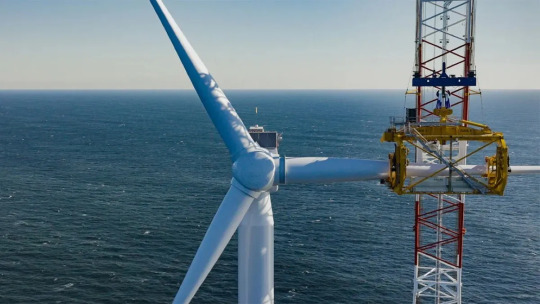
The first wind turbine installation at South Fork Wind, New York State’s first offshore wind farm, is complete.
The 130-megawatt (MW) South Fork Wind will be the US’s first completed utility-scale wind farm in federal waters.
3. Anonymous businessman donates $800k to struggling food bank

But this Thanksgiving, a longtime prayer of food bank leaders was finally answered: an anonymous benefactor donated the full $800,000 they needed to move out of a facility they've long outgrown. That benefactor, however, preferred to stay anonymous.
"Very private company, really don't want attention," said Debbie Christian, executive director of the Auburn Food Bank. "It's a goodhearted person that just wants to see the work here continue, wants to see it expand."
4. Empowering woman saving hopes and mental health of suffering Ukrainian kids

Kenza Hadij-Brahim is at the forefront of promoting Circle of Toys
Hadj-Brahim is helping to launch the Circle of Toys initiative. A project that provides Ukrainian children in need of some normality with preloved toys. This new initiative connects people with old toys they might otherwise throw away, with Ukrainian families in need who want to provide some comfort to their children in this distressing time.
Find Refuge said : “The endeavour is driven by a sincere purpose: spark joy, foster play, and bring a hint of normalcy back to the young lives in Ukraine.”
5. TWO LOST CITIES HIDDEN FOR CENTURIES WERE JUST DISCOVERED IN BOLIVIA

Researchers have found these areas not only housed structures and pyramids but it has been uncovered that there were advanced irrigation systems, earthworks, large towns, causeways, and canals that cover miles.
Dr. Heiko Prümers from the German Archaeological Institute, who was also involved in the study comments that “this indicated a relatively dense settlement in pre-Hispanic times. Our goal was to conduct basic research and trace the settlements and life there. The research sheds light on the sheer magnitude and magnificence of the civic-ceremonial centers found buried in the forest”.
6. Sheep dubbed Fiona rescued from cliff in Scotland where she was stuck for more than 2 years
youtube
And at last, some positive climate news:
7. Three positive climate developments
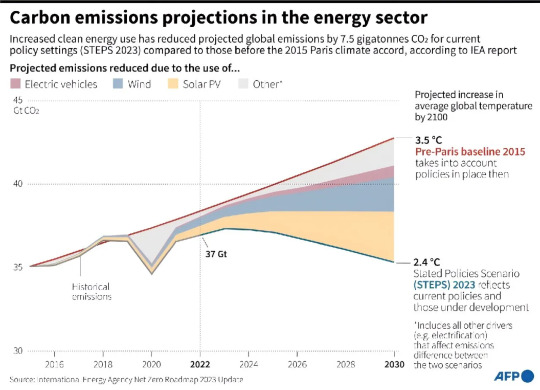
Heating
When the Paris Agreement was adopted, the global reliance on fossil fuels placed the world on a path towards a 3.5C rise in temperature by 2100. Eight years on, country commitments to reduce their carbon footprints have pulled that down slightly, putting the world on a path for a 2.5C to 2.9C by the end of the century.
Peak emissions
Annual greenhouse gas emissions responsible for climate change have risen roughly nine percent since COP21, according to UN data. But the rate of the increase has slowed significantly. Recent estimates by the Climate Analytics institute find global emissions could peak by 2024
Rising renewables
Three technologies—solar, wind and electric vehicles—are largely behind the improved global warming estimates since 2015.
---
That's it for this week :)
This newsletter will always be free. If you liked this post you can support me with a small kofi donation here:
Buy me a coffee ❤️
Also don’t forget to reblog this post with your friends.
812 notes
·
View notes
Quote
Why do companies relocate their manufacturing facilities to other countries? We all know the answer to that: To minimize labor costs. To lower the portion of the company’s revenue that goes to the people who do the work and to increase the portion of the company’s revenue that is reserved for investors and management. This is accomplished by the arbitrage of human desperation. A less desperate and impoverished group of workers is traded for a more desperate and impoverished group who will accept less money and a lower standard of living. In addition to this physical relocation of facilities, big companies routinely pursue the legal relocation of their operations to various tax havens, for the purpose of minimizing their tax payments. Physical relocation takes from workers, and legal relocation takes from the public of the nations that should, under a more common sense definition, be taking in tax revenue from these businesses. Working people get poorer, and the public gets poorer, and the gains are funneled into the pockets of the companies themselves, which is to say the investor and management classes. This is all done quite openly. It is not a secret at all. Apple manufactures its iPhones in gargantuan worker villages in poor countries like India and China and Apple evades tens of billions of dollars in taxes by stashing its money in offshore tax havens and Apple is, not coincidentally, worth close to $3 trillion.
The Real Immigration Problem Is Capital, Not Labor
87 notes
·
View notes
Text
An Offshore Love - Part One
Title: Offshore
Pairing: roughneck!ari levinson x reader
Summary: You arrive at the Jupiter and you can already tell this crew is in rough shape just by looking at them. You just hope they take you seriously enough.

A/N: This is kind of a slow burn and this first part is more focused on the reader, but if you bear with it, Ari pops up in the second part!
Warnings: All of my work is 18+, minors DNI, even if there aren't many warnings to look out for. In this first part, some warnings may include some self-doubt; mentions of the ocean & motion sickness/sea sickness; and I believe that’s it. I apologize if I missed anything but you are responsible for what you read and your own internet consumption. By clicking keep reading, you agree to these warnings and that you are over 18. I do not claim to be a professional writer, any and all mistakes are my own; nothing is beta read.
Wordcount: 2,998
You sat in the plush leather chair of the conference room, you were in your fourth meeting of the day and you had started to feel antsy. You were bouncing your pen between your thumb and forefinger as you stared out the large windows of the skyscraper of Baizen Oil Industries. A small sigh left your lips as you thought how you would much rather be on an assignment instead of being in meetings all of the time. You absolutely hated the agonizing day-to-day of office work. It was so mind numbingly dull and you didn’t have the patience for that type of work. At least when you were sent to one of the offshore oil rigs or even one of the land based ones, it provided a little more challenging work, or depending on the day, a little excitement.
“Before we conclude this meeting, I’m going to hand it over to Carter Baizen himself.” Your supervisor’s words barely registered in your ears as you continued to play with your pen. If it wasn’t for your coworker’s jab to your arm with their elbow, you would’ve continued to look out the window.
You instantly sat up and refocused your attention back to the meeting at hand, just as Carter walked into the conference room. You watched as Carter buttoned up his suit jacket as he took your supervisor’s place. Carter cleared his throat before he started to speak.
“Good day everyone, I’ll try to be as quick as I can so you can get back to work. But I came here before you today because one of our offshore oil rigs is in trouble, the Jupiter.” Carter paused for a moment as he clicked on a remote towards the center of the table and a blue holographic image of the mentioned oil rig appeared before everyone. “The Jupiter is one of the company’s most prosperous rigs, bringing in the most oil in the last five years but she also seems to be our most problematic rig. From crew members getting injured to machinery malfunctions, it seems she’s been through it all.”
This was it, your next big challenge. You immediately started to get excited at the thought of helping another oil rig out, especially since your last one was a success. At least, you thought it was. If Carter didn’t already have a team in place, you would definitely be volunteering before the meeting was over or at least by the end of the day.
“So, the plan is to send in a small team, no more than two, to get this place whipped back into shape. If this doesn’t happen, I’m afraid that we’ll end up either selling the Jupiter or shutting her down. This is completely voluntary, but if no one volunteers, I’m not afraid to pick and choose who goes.” Carter then looked around at the filled conference table, immediately noticing the nervous looks on the majority of the faces.
Here was your chance. “I’ll go.” You spoke up confidently, you were beyond certain you could handle this job.
Carter nodded at you in appreciation and you could see the look on your supervisor’s face, rolling his eyes and clearly not surprised. He knew how much you hated being in one place for too long and the fact that you had only been back barely two weeks and ready to leave, didn’t surprise him.
“Another volunteer?” Carter asked, giving everyone another chance before he picked someone.
You didn’t blame your coworkers for not wanting to volunteer, Being on an offshore oil rig was dangerous and getting there even more so. Not to mention that the Jupiter was located in the middle of the North Sea, one of the most treacherous seas in the world. As you waited for another coworker to volunteer, you thought back to your first time on one of the company’s offshore oil rigs. You were assigned to be a part of a team to collect data and to check the quality of life of the workers who were on board, along with several other assignments. Needless to say, you hadn’t quite gotten your sea legs yet and you spent the majority of your first week on the rig with sea sickness. After that though, you became a natural and developed your own system on how to get these rigs, along with the crew, back into shape.
“Um, I’ll go.” One of your coworkers stammered as he raised his hand slightly.
You internally groaned when you saw who it was, an IT guy who’s barely been with the company for five years. By the looks of him, he didn’t seem like much and he seemed much better suited for land. He’s probably never been on a boat before either; with his dainty frame, those waves would take him out in a heartbeat. But of course, you didn’t say any of that and just offered him a forced smile.
“Excellent, you two come to my office before you leave today and I’ll give you more information on this assignment. Meeting adjourned.” Carter then left the conference room, followed by your supervisor.
Shortly after that, everyone started to collect their things and went back to work. While you collected your things, the other volunteer nervously approached you.
“Hi, I’m Jake.” He introduced himself as he stuck out his hand, when he realized you weren’t going to shake it, he pulled it back and scratched the back of his head.
“I know, you’re the IT guy around here.” You replied as you continued to collect your things. You took a moment before you turned to face him and introduced yourself properly.
Jake nodded as he spoke. “I look forward to working with you, I’ve heard a lot about you.”
You let out a small huff. “I hope you don’t believe everything you hear.” You then started towards the door of the conference room.
Jake followed after you. “O-of course not. How many oil rigs have you been on?”
“Land, six; off shore, the Jupiter would make it four. Let’s get one thing clear,” You stopped and turned to face Jake, who instantly became worried. “I’m in charge here. I’ve done this countless times and I know what I’m doing.”
Jake pushed his round framed glasses up the bridge of his nose before he nodded. “Got it.”
“Oh, also, don’t let the roughnecks give you too much of a hard time.” You teased playfully.
“Roughnecks?” Jake asked as he arched a brow.
“Yeah, the crew on a rig. They do the day-to-day work to make sure the rig works properly.” You let out a small sigh, realizing how much of a rookie Jake really was, this was going to be an interesting assignment. “I’ll put together a 101 pamphlet with terms and what to expect before the day is over.”
“Hey, thanks, I’d appreciate that!” Jake beamed as continued to follow you.

By Sunday, you were locking up your apartment and making your way to the airport. Your luggage rolled behind you as you went down to the waiting company car. You greeted the driver with a tired smile as he took your luggage and placed it in the trunk and you opened the passenger door, you took a sip of your coffee from your tumbler. However, you nearly spat it out when you saw an excited Jake in the backseat of the car. You had somehow forgotten that the two of you were riding to the airport together.
“Good morning, sunshine! I wasn’t sure if you’d have coffee already or not, so I had the driver stop so I could pick up some breakfast.” Jake greeted, too chipper for your taste this early in the morning.
“I’m hearing this,” You made a motion with your hand to mock someone talking. “And I want to hear this.” You made your hand stop moving to signal silence.
Jake chuckled at your response. “Not a morning person, eh?”
You simply glared over at Jake.
“Alright, alright, I get it sunshine.” Jake said and he acted as if he was sealing his lips and then locked them.

When you landed in Germany and finally got to the port, you took in a deep breath of the ocean air causing a smile to curl up on your lips. You glanced over at Jake and immediately noticed how pale he looked. It reminded you of yourself when you went on your first offshore business trip. You looked back out to the ocean, the waves were relatively calm near the port but you knew the further out you went, that would change in a heartbeat.
“Baizen Oil Industries?” A dock worker asked as he jogged up to you and Jake, his voice slightly raised.
“Yes, that’s us.” You said as you turned to the man.
“The shuttle to take you to the Jupiter is ready for you, if you follow me.” The dock worker gestured.
“Of course.” You said and you motioned to Jake to follow.
When you got to the boat, the dock worker was claiming to be your shuttle, you were in awe. The boat was more like a massive barge ship and you were in awe of the size of it.
“This is a shuttle?!” Jake exclaimed, stopping to look up at the ship before he stepped onto the boarding ramp.
“Welcome to the Orion.” The dock worker announced, his voice somehow deeper than before as he welcomed you to the barge ship.
Jake then bent over and started to throw up causing the dock worker to shake his head and chuckle. You couldn’t help but do the same before you stepped onto the boarding ramp.
“Come on Jake, we don’t want to be late.” You said, adjusting your bag on your shoulder.
You watched the waves crash against the ship, a sense of calm washing over you, compared to your counterpart anyway. Jake hadn’t stopped throwing up and currently had his head in a bucket. As you glanced back at him, you were grateful that at least one of you had your sea legs.
“Why is it always carrots? I haven’t even had carrots.” Jake mumbled before he threw up again.
You laughed quietly to yourself before you turned your attention back to the ocean, watching the waves from one of the cabin rooms. You swore that each wave that formed was bigger than the last one. Each wave crashed into the barge ship as if it was nothing, causing the ship to rock and tilt to its side. The waves were thick and packed quite the punch, you couldn’t help but wonder how these men came out onto this sea every day. There were several times where you thought the waves were going to knock the ship over and capsize. However, the Orion prevailed and continued to make its way through the North Sea to get to the oil rig.
When you finally reached the Jupiter, your eyes nearly bugged out at the sheer size of the oil rig. Sure, you had been to multiple offshore sites but this one had to be the biggest one yet. The platform stood on top of a single, concrete let that was giant in itself and at least several hundred feet above the sea; yet the waves were still grazing the bottom of the platform. Your eyes wandered all over, trying to figure out what sight to take in first. The platform was just as impressive as the concrete leg it stood on, built from a mixture of solid concrete and heavy duty, industrialized iron, it was truly a sight to see. You were always in awe of these oil rigs that you visited. As you continued to stare up at the structure, your nerves started to kick in and you suddenly felt uneasy. However, you kept it together, you’d be damned if you gave these men any inclination that they could roll right over you. You were pulled out of your thoughts when the Captain ushered you and Jake down to the deck of the ship. There, you spotted a few workers trying to direct a metal cage that was being lowered onto the deck of the barge ship by a crane.
“What the hell is that?!” Jake exclaimed as he adjusted his glasses.
“That son, is your way up to the Jupiter.” The Captain of the Orion said, clapping Jake on the shoulder.
The door of the metal cage opened and out stepped a heavyset, older brunette and you could feel him instantly judging you and Jake. You knew exactly what he was doing, he was trying to see if you were going to be a pushover or not, but he’d be in for a rude awakening. You held your head high as you walked towards the man, sticking out your hand as soon as you were close enough and introduced yourself to him. He eyed you up and down, one more time before he spoke, shaking your hand in return.
“Lee Bodecker, ma’am, I’m the rig manager here. Welcome to the Jupiter.” Lee introduced himself as he sucked on his teeth.
“Pleasure. This is my assistant, Jake Jensen.” You greeted politely and with a tight lipped smile.
“What’s up?” Jake greeted with a nod as hugged his belongings to his chest.
You internally groaned as Jake greeted the rig manager the way that he did.
Thankfully, Lee just chuckled as he turned his attention towards Jake. “What’s the matter son? Don’t got yer sea legs yet?”
“Afraid not, first time out on an oil rig, let alone the ocean.” Jake admitted, it was evident that Jake had been suffering from some sea sickness. From the lack of color in his face to the sweat dripping from his brow from constantly throwing up.
“I can tell. Well, let’s stop dilly dallying and get to work. After you!” Lee then stepped to the side to allow you and Jake into the metal cage.
With a jolt, the cage started to lift and just in time as a wave crashed onto the deck of the Orion. A cold breeze enveloped you as the wind picked up slightly, causing the cage to sway as well. When you got to one of the landings of the platform of the Jupiter, Lee opened the cage door and allowed you and Jake to exit first. As Lee led the two of you through the oil rig, you could feel everyone’s eyes on you and Jake as you passed by. You could feel your stomach begin to lurch but you kept holding your head high. As you looked around, to try and familiarize yourself a little bit, you could tell that these men looked a little more on the rough side than most crew that you’ve been around. You only hoped that you could help them as much as possible and get their quality of life back to where it should be while living on an oil rig.
“I’ve set up a couple of meetings for the two of you tomorrow morning. You’ll meet the rest of the crew and management then.” Lee called back to you. “Tonight, the two of you focus on settling in your new quarters. I hope you don’t mind bunk beds.”
“Sounds good, thank you, Mr. Bodecker.” You called back to him, having to shout over the noises of the oil rig.
“Please, it’s Lee.” Lee insisted as he glanced back at you and Jake.
Lee held open a door and it was almost instantly warmer and brighter in this part of the oil rig. You also noticed that there was a lot more life in this part as well.
“This is the Hub, the life of the Jupiter. Here, you’ll find entertainment rooms, the cafeteria and a few other eateries, laundry, the sleeping quarters and there’s even a gym if you’re into that sort of thing. There are also a few offices and conference rooms located in this part of the oil rig. There is internet but it can be a bit spotty sometimes.” Lee informed as he strutted through the building, pointing out different amenities.
The three of you reached the third floor and Lee showed you to your new quarters for the next couple of weeks. You peered into the room once Lee had opened it and expected Lee to show another room for Jake. However, when he didn’t, you spoke up.
“Are we sharing a room?”
“What? I don’t have a problem with that. I’ll even take the top bunk.” Jake offered as he walked into the room and took a look around. “Pretty spacious here actually.”
“Good man, Jake. Sorry, miss, but we’re full to the brim here. I actually had to kick out the two who were staying in here just to make room for you lot. They were not happy.” Lee explained, his southern drawl making its presence.
“Right, well then, thank you Lee, I appreciate your hospitality.” You gave him a small, tight-lipped smile, the last thing you expected was having to share a room with someone.
Lee simply nodded. “Dinner is whenever you feel like eating, so if you want food, you can come down. Otherwise, your first meeting is tomorrow at seven in the morning and I’ll have someone come get you.”
“Sounds good. I think I’m in for the rest of the night, so, I’ll see you tomorrow at seven.” You said, wanting to get some work done tonight and put some finishing touches on a few things.
Lee didn’t say anything, he simply turned on his heel and walked away. You then stepped into the room and noticed Jake already setting up shop. A small smirk curved up slightly onto your lips as you did the same thing. You couldn’t lie, a part of you was extremely nervous about the next day and yet, you were also looking forward to the next few weeks while aboard the Jupiter.
#an offshore love#an offshore love mini series#new mini series#ari levinson mini series#part one#an offshore love part one#ari levinson x reader#roughneck!ari levinson#roughneck!ari levinson x reader#ari levinson#ari levinson fanfiction#ari levinson fandom#ari levinson series#ari levinson x female reader#chris evans characters#chris evans fandom#chris evans#ari levinson au
56 notes
·
View notes
Text
The unexpected upside of global monopoly capitalism

I'm touring my new, nationally bestselling novel The Bezzle! Catch me TODAY (Apr 10) at UCLA, then Chicago (Apr 17), Torino (Apr 21) Marin County (Apr 27), Winnipeg (May 2), Calgary (May 3), Vancouver (May 4), and beyond!

Here's a silver lining to global monopoly capitalism: it means we're all fighting the same enemy, who is using the same tactics everywhere. The same coordination tools that allow corporations to extend their tendrils to every corner of the Earth allows regulators and labor organizers to coordinate their resistance.
That's a lesson Mercedes is learning. In 2023, Germany's Supply Chain Act went into effect, which bans large corporations with a German presence from using child labor, violating health and safety standards, and (critically) interfering with union organizers:
https://www.bafa.de/EN/Supply_Chain_Act/Overview/overview_node.html
Across the ocean, in the USA, Mercedes has a preference for building its cars in the American South, the so-called "right to work" states where US labor law is routinely flouted and unions are thin on the ground. As The American Prospect's Harold Meyerson writes, the only non-union Mercedes factories in the world are in the US:
https://prospect.org/labor/2024-04-08-american-workers-german-law-uaw-unions/
But American workers – especially southern workers – are on an organizing tear, unionizing their workplaces at a rate not seen in generations. Their unprecedented success is down to their commitment, solidarity and shrewd tactics – all buoyed by a refreshingly pro-worker NLRB, who have workers' backs in ways also not seen since the Carter administration:
https://pluralistic.net/2023/09/14/prop-22-never-again/#norms-code-laws-markets
Workers at Mercedes' factory in Vance, Alabama are trying to join the UAW, and Mercedes is playing dirty, using the tried-and-true union-busting tactics that have held workplace democracy at bay for decades. The UAW has lodged a complaint with the NLRB, naturally:
https://www.commondreams.org/news/alabama-mercedes-benz
But the UAW has also filed a complaint with BAFA, the German regulator in charge of the Supply Chain Act, seeking penalties against Mercedes-Benz Group AG:
https://uaw.org/uaw-files-charges-in-germany-against-mercedes-benz-companys-anti-union-campaign-against-u-s-autoworkers-violates-new-german-law-on-global-supply-chain-practices/
That's a huge deal, because the German Supply Chain Act goes hard. If Mercedes is convicted of union-busting in Alabama, its German parent-company faces a fine of 2% of its global total revenue, and will no longer be eligible to sell products to the German government. Chomp.
Now, the German Supply Chain Act is new, and this is the first petition filed by a non-German union with BAFA, so it's not a slam dunk. But supermajorities of Mercedes workers at the Alabama factory have signed UAW cards, and the election is going to happen in May or June. And the UAW – under new leadership, thanks to a revolution that overthrew the corrupt old guard – has its sights set on all the auto-makers in the American south.
As Meyerson writes, the south is America's onshore offshore, a regulatory haven where corporations pay minimal or no tax and are free to abuse their workers, pollute, and corrupt local governments with a free hand (no wonder American industry is flocking to these states). Meyerson: "The economic impact of unionizing the South, in other words, could almost be placed in the same category as reshoring work that had gone to China."
The German Supply Chain Act was passed with the help of Germany's powerful labor unions, in an act of solidarity with workers employed by German companies all over the world. This is that unexpected benefit to globalism: the fact that Mercedes has extrusions into both the American and German political spheres means that both American and German workers can collaborate to bring it to heel.
The same is true for antitrust regulators. The multinational corporations that are in regulators' crosshairs in the US, the EU, the UK, Australia, Japan, South Korea and beyond use the same playbook in every country. That's doubly true of Big Tech companies, who literally run the same code – embodying the same illegal practices – on servers in every country.
The UK's Competition and Markets Authority has led the pack on convening summits where antitrust enforcers from all over the world gather to compare notes and collaborate on enforcement strategies:
https://www.eventbrite.co.uk/e/cma-data-technology-and-analytics-conference-2022-registration-308678625077
And the CMA's Digital Markets Unit – which boasts the the largest tech staff of any competition regulator in the world – produces detailed market studies that turn out to be roadmaps for other territories' enforces to follow – like this mobile market study:
https://assets.publishing.service.gov.uk/media/63f61bc0d3bf7f62e8c34a02/Mobile_Ecosystems_Final_Report_amended_2.pdf
Which was extensively referenced in the EU during the planning of the Digital Markets Act, and in the US Congress for similar legislation:
https://www.congress.gov/bill/117th-congress/senate-bill/2710
It also helped enforcers in Japan:
https://asia.nikkei.com/Business/Technology/Japan-to-crack-down-on-Apple-and-Google-app-store-monopolies
And South Korea:
https://www.reuters.com/technology/skorea-considers-505-mln-fine-against-google-apple-over-app-market-practices-2023-10-06/
Just as Mercedes workers in Germany and the USA share a common enemy, allowing for coordinated action that takes advantage of vulnerable flanks wherever they are found, anti-monopoly enforcers are sharing notes, evidence, and tactics to strike at multinationals that are bigger than most countries – but not when those countries combine.
This is an unexpected upside to global monopolies: when we all share a common enemy, we've got endless opportunities for coordinated offenses and devastating pincer maneuvers.

If you'd like an essay-formatted version of this post to read or share, here's a link to it on pluralistic.net, my surveillance-free, ad-free, tracker-free blog:
https://pluralistic.net/2024/04/10/an-injury-to-one/#is-an-injury-to-all
#pluralistic#monopoly#labor#nlrb#germany#harold meyerson#supply chain act#right to work#onshore offshore#uaw#vance alabama#vance#alabama#bafa#mercedes#antitrust#trustbusting
694 notes
·
View notes
Text




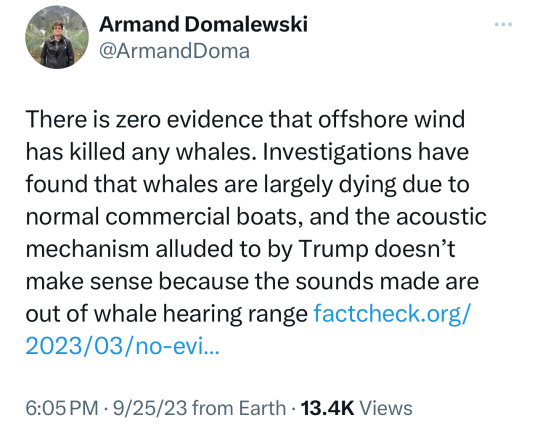
Hey, waitaminute! Are you telling me that Trump really isn’t concerned with the safety of whales, and is really trying to kill a green renewable source of energy?


But why would Trump dO that? Why would he lie?
The only people who this disinformation helps is Big Oil companies, and everyone knows that Trump doesn’t have a history of lying his ass off, right? I mean, everyone knows how much Trump hates big business and loves nature. Surely Trump, the person known for his great love of animals, isn’t lying about windmills killing whales, right??
</sarcasm>
BUT SERIOUSLY: Trump is lying about everything again.

👉🏿 https://www.factcheck.org/2023/03/no-evidence-offshore-wind-development-killing-whales/
#politics#republicans#donald trump#whales#windmills#wind farms#green energy#renewable energy#renewable resources#lies and the lying liars who tell them
94 notes
·
View notes
Text
The Princess Royal visits British Columbia, Canada.
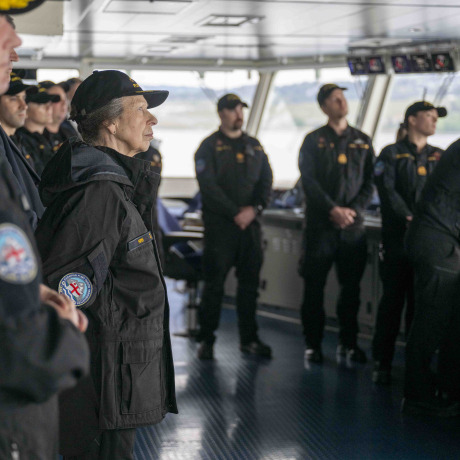
As Commodore-in-Chief of the Canadian Fleet Pacific, Her Royal Highness The Princess Royal, accompanied by Vice Admiral Sir Tim Laurence, has been in British Columbia for a series of engagements with the Royal Canadian Navy.
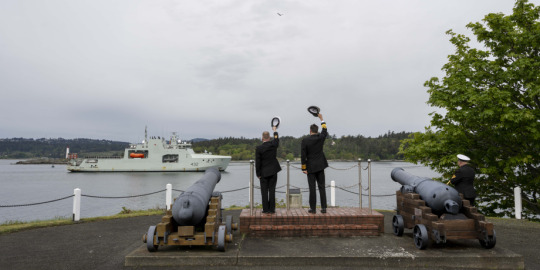
Upon arrival in Canada on Friday 3rd May, The Princess Royal attended the Commissioning Ceremony for the HMCS Max Bernays – the Canadian Pacific Fleet’s first Arctic and Offshore Patrol Vessel. The Princess Royal also had an opportunity to tour the ship and meet some of its company.

The following day, on Saturday 4th May, Her Royal Highness laid a wreath at God’s Acre Cemetery as President of the Commonwealth War Graves Commission. The historic cemetery, in Esquimalt, is the final resting place of more than 2,500 military personnel and their families.

Next, The Princess Royal visited the Maritime Museum of British Columbia Archive to view some of the items in its archival collection.

After learning that there was no naval museum during a visit to Esquimalt in 1951 by the then Princess Elizabeth and Prince Phillip, Prince Philip contacted the Greenwich Maritime Museum and asked them to send some objects to British Columbia to start a new naval museum thus creating the Maritime Museum of British Columbia.

The Princess Royal also visited FED Urban Farm to hear about their work in providing home-based start up food gardens during the Pandemic which used simple and affordable supplies.

On Sunday 5th May, The Princess Royal and Sir Tim Laurence attended the Battle of the Atlantic Memorial Parade. The Battle of the Atlantic was the longest continuous battle of the Second World War and the Parade commemorates the service and sacrifice of the thousands of Canadians who fought for control of the North Atlantic Ocean to supply the war effort from 1939 to 1945.

© Royal UK
#NOT EVERYTHING WAS MENTIONNED BY THESE FUCKERS#IDK WHY#UGH#princess anne#princess royal#tim laurence#timothy laurence#brf#british royal family#workanne
33 notes
·
View notes
Text
here's the thing: you've heard "there's no ethical consumption under capitalism" but i'd like to propose another sentiment that i feel: ethical employers under capitalism are as prevalent as ethical consumption.
i have worked for three companies. each of them have been extremely unique from the last. i initially worked in retail. then i worked for a call center. now i work in technology.
when i worked in retail, i saw how money and commerce and consumerism affects society. i saw the physical effects of capitalism on your body; managers who were in their 40s looking like they're in their 60s.. yeah, 20 years of retail will do that to you. i saw waste, i saw egregious labor violations, i saw regular people just flat out not get paid for work they did. work i watched them do. all because someone didn't put their punches in a timesheet. i worked in hr during this time, so i saw the truth about how hr is not on the side of the worker and is, in fact, an arm of the shareholders.
then i worked in a call center environment. and i saw the effect that capitalism has on the mind. the psychological warfare of an employer with over 100% attrition, the churn and burn of call center work. the dehumanizing feeling of being absolutely trashed by a drunk person or called slurs and knowing if you hang up, you lose your job. the constant surveillance state that monitors every website, every phone call, every movement you make.
now in technology, i see the The Emperor Has No Clothes. a facade of better wages, better benefits - but only if you're willing to sacrifice your every free minute, every second to the machine. and if you don't, you're cast as an outsider; someone who doesn't want to succeed and move up the ladder and grow. and i've seen that technology in the wrong hands is more harmful than the benefits of technology to a society by a magnitude. and i've seen the absolute terror that private investment eventually has on good, equitable and decent corporations. corporations with leadership that ultimately, in the end, settle on the billions of dollars in payouts over their worker's lives.
private investment companies are just one way that capitalism is eroding the fabric of the american workplace. offshoring, cutting costs to the bare bones and then flipping the company from private to public and making an absolute killing. constant stock buybacks, investing only in the future of their own capital. it's a smash and grab. the victims are the american taxpayer and the american worker.
the truth is that if you find an equitable, fair employer, they will eventually outgrow themselves. corporations are small scale capitalist experiments. success breeds massive growth, out of control, until the system topples or is razed for it's resources.
i'm not saying there's no ethical employment under capitalism but as the days pass, the truth is that unless you are working for a bonafide and vetted non-profit organization, that reality is that boasting you have an "ethical" employer is often going to be a short term claim. capitalism will seep in and poison your employer the moment that the profit motive appears too delicious to deny.
112 notes
·
View notes